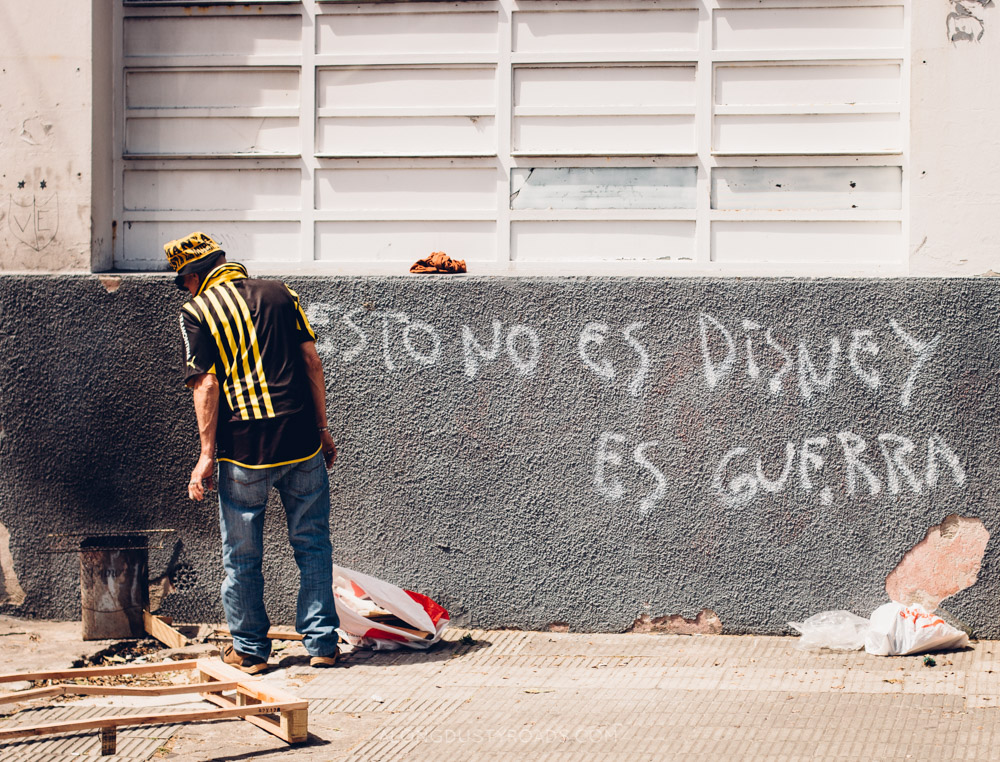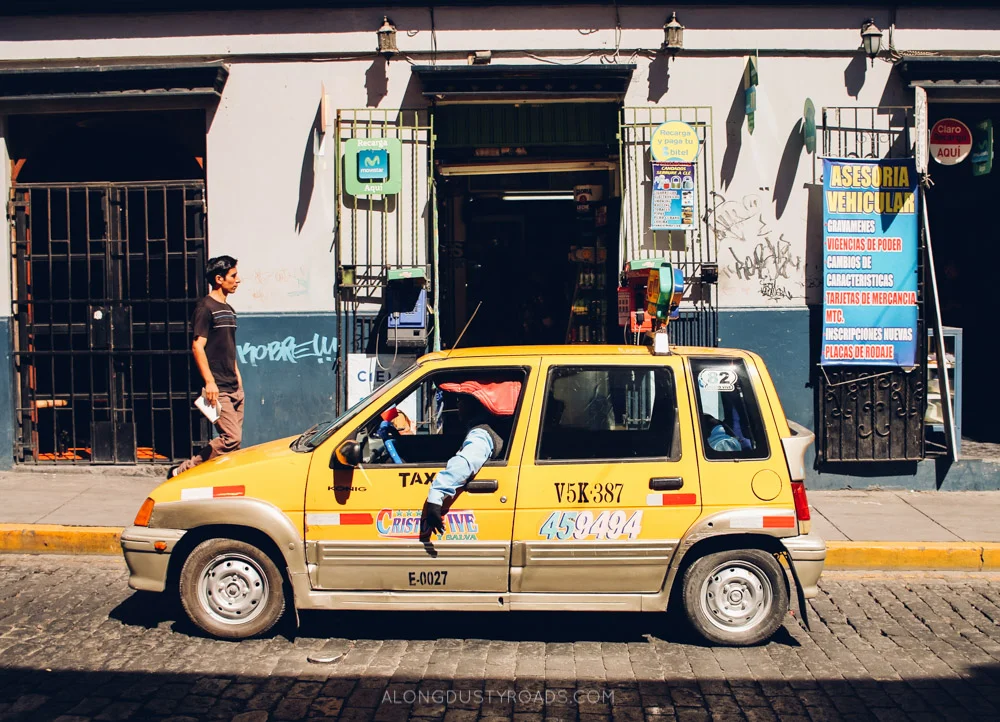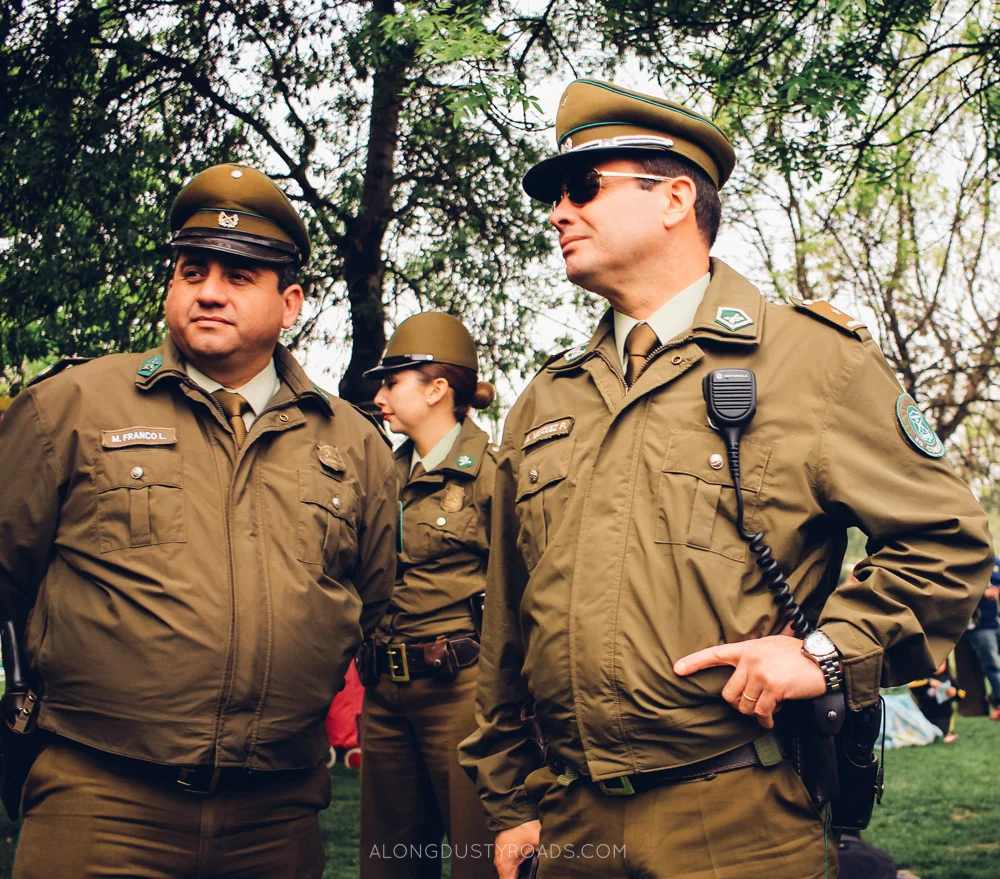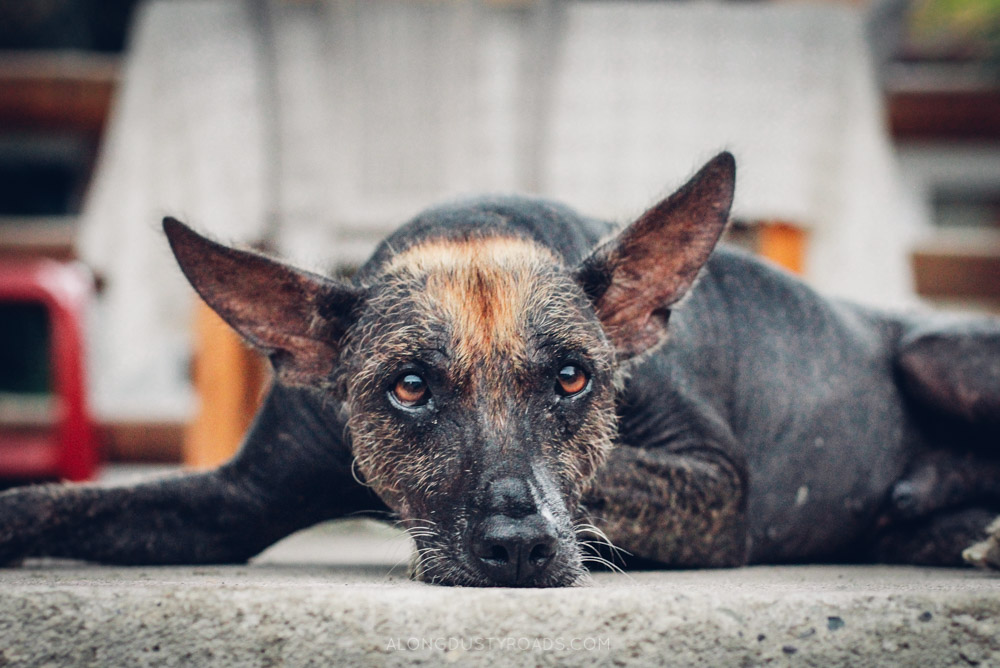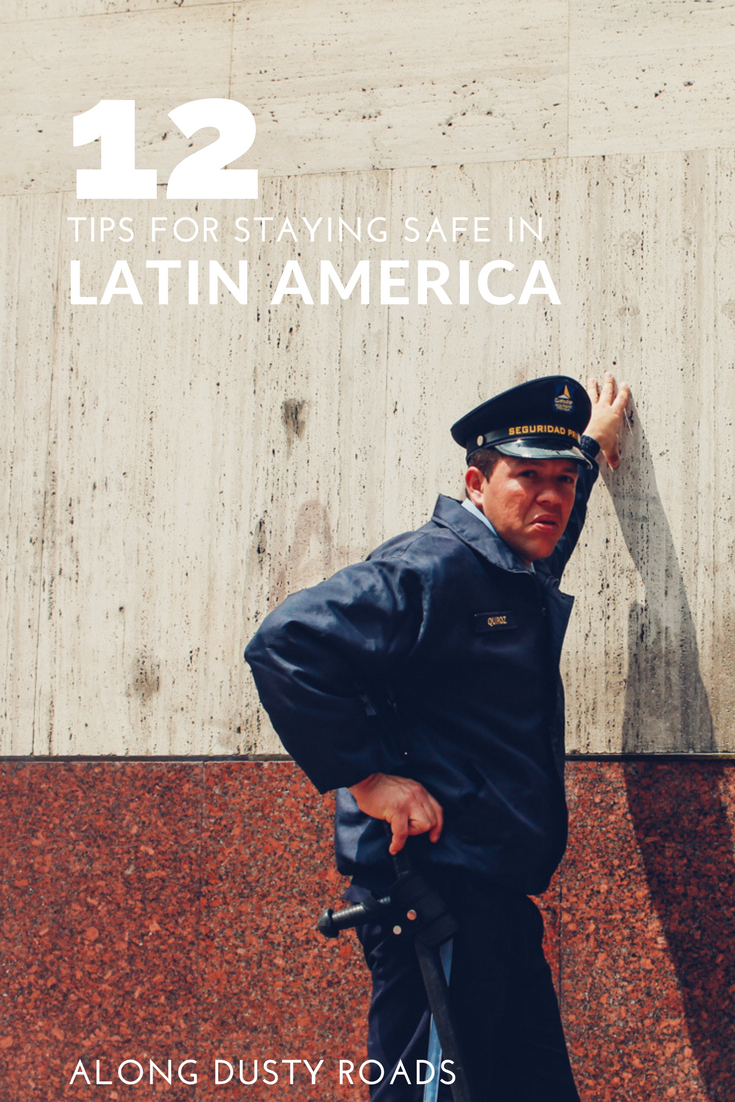A few years ago, we read something quite shocking - an article listing the world's most dangerous countries.
Just months later, we had plans to visit almost all of them. Yeah, we got a little bit worried.
And yet, having now completed our two years in Latin America (and without fear of tempting fate), we can proclaim that nothing bad happened to us. We saw guns in the hands of those that were there to protect us, we saw guns in the hands of men who certainly could have done us harm, and we're pretty sure that we saw the aftermath of what those guns are capable of, but never, not once, were those guns aimed at us.
We suffered no muggings, no car-jackings, no highway robberies, no bus crashes, no thefts from dorm rooms, lockers or our backpacks while we slept.
We saw the effects of countries destroyed by violence, but were spared the same fate.
Are we the lucky ones or is it that Latin America's really not as bad as it appears in the news?
In reality, it's a bit of both, but we know it was also bit of us. Whilst we never let paranoia get in the way of an amazing experience, we take our personal security very seriously, and developed a set of unspoken, common-sense rules about how to have the best time whilst limiting unnecessary risks - and we'd like to share them with you**.
We can't guarantee that nothing bad will happen on your adventure, just like we can't go out our front door right now and guarantee we won't get hit by a bus or mugged for our milk money - sometimes stuff just happens because you're in the wrong place at the wrong time.
#1 if a local tells you it's a dodgy area, for the love of god listen to them
If we were to tell you that there's a road not 10 minutes from our flat that's best avoided at night, we'd hope you'd listen to us. The same is true here. Locals know their neighbourhoods very well, they grow up with significantly more threat of violence than most of us and are very aware of how best to avoid particularly dodgy areas.
Whenever we arrived in a new place, be that a city or small village, we would always make a point of clarifying with hostel owners if there were any streets or neighbourhoods nearby that we should avoid - be that just at night or in the day also.
#2 stay in a hostel with lockers
We walked away from a number of perfectly lovely hostels because they were lacking a very simple element - secure lockers.
Whilst not such a concern if you're staying in a private room, if you opt for a dorm bed, having a safe place to lock your valuables isn't just a pleasant added extra - in our opinion it's essential.
We never travel without a padlock, for this very reason. We use this combination code padlock - it means we never have to worry about losing the key, and if airport security need to get into our bag, they can hopefully do it without having to destroy the lock.
If you're staying in a private room but still want a little extra security, consider buying a Pacsafe bag for your valuables. They're pretty much indestructible and make getting into your bag near impossible (just don’t leave it unattended though!)
Don't take the hostels reassurances that "we've never had any problems like that here". Your travel insurance company won't care about this, and you can bet your bottom dollar that should the worst happen, that same hostel won't be buying you a new macbook.
We use hostelworld and booking.com to book our hostels, and each should list whether a particular accommodation has lockers. New to this whole hostel lark? You need to read our beginner's guide to hostels.
#3 don't necessarily trust a police officer
In Latin America, cops aren't always what they seem.
There are bad cops looking for bribes (think fake speeding tickets and all sorts of apparent traffic offences), cops that really don't want to help you should you need to report a crime, and then there's fake cops.
The most commonly warned against scam involves being stopped in the street by someone who seems just like a regular tourist or friendly local asking for help. Shortly after, a man claiming to be an undercover police officer will approach and ask for a copy of your passport, the accomplice reassuring you that this is OK.
It's not OK, it's all part of an elaborate ruse to rob you. There are a few varieties of this scam, and this article covers the most well-known.
Now, whilst you may indeed be asked to show a passport by a random cop (it happened to us in Bolivia), they will always be in proper uniform and have appropriate ID. For this purpose, we had a paper copy of our passport with us at all times, made sure the conversation took place inside a restaurant and kept an eye on our surroundings.
#4 don't hail taxis
A well known scam in this part of the world is the 'fake taxi'. Either this will be one that you flag down off the street, one parked outside of a designated pick-up point, or perhaps even one that a seemingly helpful local calls for you.
The taxi will then make several stops at cash machines, insisting (under threat of violence) that you must withdraw cash for them.
Your best defence against this scam is to either only take taxis parked in official pick-up spots (like inside airports) or get your hostel/hotel to phone one for you. If you absolutely must flag one down, be aware of what signage or markings official taxis in that particular country have both inside and out - and don't be afraid to make it clear that that is what you are checking for.
Update 2019 | So many cities in Latin America now have Uber, or a local taxi app, so make us of them for extra security and confidence.
#5 if you do get mugged, don't resist
If we were ever to get mugged in the UK, we'd like to think that we may put up a bit of a fight - or at least run away.
In Latin America, we'd do neither.
The chances of your assailant having a gun here are exponentially higher - whether they show it to you or not - and, unfortunately, the past experience of others has taught us that they'e not afraid to use it.
If the worst happens and somebody attempts to rob you, do not resist. Calmly handover whatever it is that they are asking for and when they've left walk away and immediately report it to the police.
#6 avoid flashing cash
A significant number of countries in Latin America face terrible pockets of poverty, and as we all know, poverty breeds crime. A rich looking tourist with an expensive camera hanging around their neck, an iPhone sticking out of their back pocket and a fancy looking watch (even if it is a knock-off) is an easy target and it's enough to get you mugged in many of the places we visited.
Of course, this doesn't mean should never go out with your camera (the thousands upon thousands of photos that we returned with are testament to that), but you need to be be careful, and aware of your surroundings. Instead of always having the camera out, take a small bag (ideally one like this, that doesn't actually look like a camera bag!) and have it hidden from sight when you're walking from A to B and try to focus on those around you as much as what you see through your lens. Also, try to keep cash on your person down to a minimum when you're out and about - personally, we prefer to stuff it in our pockets rather than using a wallet (which inevitably contains your ID, credit cards etc).
#7 don't get involved with drugs
Drugs are big, big business here. In fact, the world's three largest producers of cocaine are all in South America. But, this doesn't mean that you should indulge.
By experimenting with drugs in Latin America you are propping up a business which has killed, and continues to kill, thousands of people per year - and putting yourself at risk. Not only are the penalties for getting caught with narcotics severe, but the very act of buying them can put you in dangerous situations.
After all, if your drug dealer robs or assaults you, what can you do?
#8 keep an eye on your valuables
Getting separated from your big backpack on buses is quite normal - it will either go on the top or underneath the bus until you want to get off. Your small day bag however (you know, the one with your passport, cash, laptop and camera), you should keep on your person at all times. Even if you go to sleep, you should keep this on your lap at all times - unless you are on a very fancy bus, where there is a barrier between the back of your seat and the person behind, never ever put your bag under your seat.
A frequent tactic for thieves is certain parts of Latin America (we're looking at you Ecuador!) is to slit your bag and remove its contents whilst you think it's safely under you seat and have a quick snooze - by the time you notice, the culprit is long gone.
You know that Pacsafe bag we mentioned earlier? Yeah, well that one's kind of perfect for this! Also, note that on day and night buses alike, there is a scam where someone will insist you sit on a safer or better seat. Although they may look official, this is usually a con to move you somewhere where they know that they can successfully nick what they want from you whilst you're in that 'safer' seat.
Thefts at the beach are also a notable risk, namely when you leave your bag unattended to enjoy the ocean. Try to visit the beach with as few valuables as possible and, if the ocean is calling, ask someone you can trust nearby to keep an eye out whilst you take a dip.
#9 be cautious with night buses
We feel the need to preface this with the confession that we actually took lots of night buses. It makes economical and time-saving sense to take long journeys overnight and not in the day.
However, there are certain routes where this simply isn't recommended. Some roads are popular spots for highway robberies, and others are just not safe to be driven at night because of dangerous bends or dodgy surfaces.
Thankfully, these no-go nighttime routes are few and far between with the odd problematic journey well-highlighted in guidebooks within specific city sections. Should you have any concerns, consider asking people at your hostel (both staff and guests) for their experiences and recommendations. The vast majority of tourist routes are perfectly safe, but it never hurts to make sure you've done your research.
#10 be aware of your surroundings
We developed a little code on our trip, a secret word that one of us would utter should we spot someone a little bit dodgy. Sometimes it meant we crossed the road, sometimes we picked up the pace a little. Most of the time, it just meant we stopped playing with our camera or cooing at a nearby dog and focused completely on our surroundings.
Whilst we probably overestimated the amount of bad guys in our midst, we can both think of a few times that our actions potentially prevented something bad happening.
Of course, we don't want to encourage paranoia, the vast amount of people you'll encounter wish you absolutely no harm at all - but it won't hurt you to keep an eye out for those that might.
#11 a word about street dogs
We're huge animal lovers. In fact, we're the sort of people who would probably do something stupid on the off chance that it might save the life of something cute and furry.
For the most part, in the cities, we ran into absolutely no problems (apart from encountering far too many skinny pups that broke our hearts) but in the countryside, sometimes things were a little trickier. Dogs here get terribly protective over their territory, and strays in the sticks were the most protective of all.
Unfortunately, we learnt that the hard way, when Emily was bit by one in the middle of nowhere on our way to Machu Picchu - thankfully we were both up to date with our rabies vaccines, but still, it was a scary situation to be in.
We're not saying don't give your leftovers to the hungry hound at your feet, or not to play with the new puppies living underneath your shack, just please do be aware that you have to treat dogs here differently to those you encounter at home - and when you're on a walk, carry rocks and throw first, think later!
#12 take out travel insurance
No, seriously. You're an idiot if you travel to this part of the world (or, well, any part of the world for that matter) without it.
Theft, illness, missed flights - all are things that can go wrong on any trip. Yet, whilst we'll happily say that Latin America isn't nearly as dangerous to visit as some people would have you believe, the worst that can happen here may well be significantly worse than a weekend break to Barcelona.
For our European readers, we hands-down recommend True Traveller (they used to only cover the UK but have recently made the excellent decision to extend Europe wide!), but for everybody else, look no further than World Nomads. Don't think you need insurance? Then read this article.
** Although we followed these guidelines in all the countries that we visited, it really wasn't always necessary. Latin America is a hugely diverse place, and to lump them all together would be completely naive - some places are much more like Europe in terms of security. However, even when we're in Europe, we're still careful!

